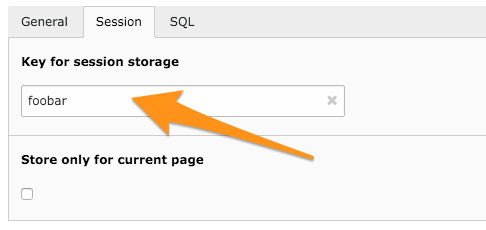DEPRECATION WARNING
This documentation is not using the current rendering mechanism and is probably outdated. The extension maintainer should switch to the new system. Details on how to use the rendering mechanism can be found here.
Session storage¶
A filter can be stored into the session with the purpose of being accessed by another filter. To force a filter to be stored into the session, one must simply give it a session key (in the "Session" tab of the input screen).

The "Session" tab of a datafilter record
The next time this filter is called up, its result will be stored into the session with the key "foobar". Let's assume the following configuration:
interval5-10 :: pages.{vars:field_name} = [5,10]
The information will be stored in the following array format:
| filters |
|
Operator and value are stored separately, but as a convenience they are also stored concatenated together. The advantage is that you can use a single subexpression to get both the operator and the value.
Note
If the value is an array, it will be transformed into a comma-separated string. This will obviously fail for multidimensional arrays, but it was decided to be an acceptable limitation. Indeed parsed filter values are meant to be retrieved using expressions (as per example below), so they must be of a simple type. Multidimensional arrays could have been serialized, but this value would have been unusable afterwards. Anyway it is not clear how Data Providers would interpret multidimensional arrays.
Example:
pages.uid {session:foobar|filters|pages.uid|interval5-10|condition}
which will be interpreted as:
pages.uid = [5,10]
and then evaluated as a filter configuration line.